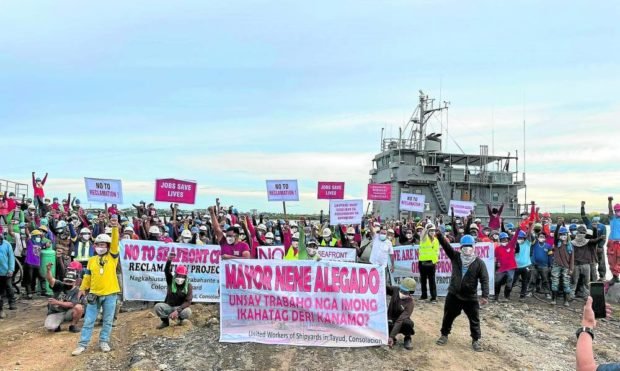
Workers of a shipyard company stage a protest in October last year against a reclamation project in Consolacion, Cebu province, that is feared to shut down nine shipyards operating in the town. | Contributed photo
MANDAUE CITY, Cebu — Local groups have bonded together to “Save Cebu” from reclamation projects and waste incineration that are detrimental to the environment.
Called Save Cebu Movement, the alliance composed of farmers and fisherfolk groups, civil society organizations, environmental advocacy groups, faith-based organizations, partners in the academe, legal aid, youth groups, lawyers and businesses, was formally launched on Saturday afternoon, Nov. 5, at the UP Cebu grounds to “call on the government to say yes to a sustainable Cebu.”
The group said it was the responsibility of government “as duty-bearers, to protect our right to a healthy environment not just for the present, but also for the future generations of Cebuanos.”
In its statement, the Save Cebu Movement said that “Cebu is one of the most ecologically-rich islands from our reefs to our ridges. However, with rich biodiversity comes adversity. Cebu is one of the islands with the most number of massive reclamation projects at various stages of development, placing the Sugbuanons in grave danger, including marine and fishing resources that provide food and livelihood to many Filipinos. Waste incineration projects also threaten our right to clean air.”
Quoting records from the Philippine Reclamation Authority, the movement said there are now 187 applications for reclamation projects in the country. Of this number, 74 are located in Luzon, 91 in Visayas, and 22 in Mindanao. Of the 50 applied, approved or existing reclamation projects, a total of 10 or 1/5 of the total number are located in Cebu.
“This makes Cebu as the ‘ground zero’, with the most number of massive reclamation projects at various stages of development,” part of Save Cebu Movement’s statement read.
In this October 17, 2020 photo, fishermen hold a protest at sea on their wooden outriggers off the coast of Barangay Tayud, Consolacion town in northern Cebu to oppose the planned reclamation project in the area. | Contributed photo
Proposed reclamation projects are located in Minglanilla (100 hectares), Consolacion (235.8 hectares), Mandaue City (131 hectares and 95 hectares), Cordova (125 hectares, 1500 hectares, 254 hectares and 47.87 hectares), Lapu-Lapu City (203 hectares), Talisay City (225 hectares).
“No less than the Philippine Constitution guarantees subsistence fishermen the right to the preferential use of local marine and fishing resources. In fact, both national and local government share the responsibility of managing and maintaining the ecological balance of our country. We must then ask, why are they allowing these illegal dump-and-fill projects to cause irreversible damage on our ecosystem? We call on the government to stop these activities for the sake of the Filipino people and the environment,” said Lawyer Gloria Estenzo Ramos, Oceana vice president.
Lawyer Christopher John Menguito, managing trustee of the Philippine Earth Justice Center, said “the alliance opposes these environmentally destructive dump-and-fill projects using law and science.”
“We call on the public to support us and join us as we call on the national and local government leaders to safeguard the people’s right to a balanced and healthful ecology and ensure that the strict implementation of our laws so that our environment remains protected and unimpaired,” Minguito said.
Participants sign a manifesto to oppose reclamation projects in Cebu. | Contributed photo
Before the gathering ended, participants signed a manifesto as they joined the call “to stop illegal reclamation and other destructive coastal development projects.”
“People in power promote these projects as the cure to our country’s economic ills. They promise jobs, secure future, growth, and development without even calculating the impact it brings to the marine ecosystem, and to people’s food and nutritional security,” part of the manifesto read.
However, “scientific studies show that land reclamation and other coastal development projects cause irreversible environmental degradation.”
“It destroys the habitats of fish, their spawning grounds, and inflicts harm on the coastal resources found in our municipal waters which supports the livelihood of our marginal fisherfolk,” it added.
The group also referred to reclamation projects as “destructive projects” and “are incompatible with the people’s fundamental right to a balanced and healthful ecology, a right which carries with it the correlative duty not to impair the environment.”
“These projects also violate laws, which guarantee subsistence fisherfolk the right to the preferential use of local marine and fishing resources, both inland and offshore,” the manifesto said.
“It is time to mend distorted priorities. It is high time to listen to science and to the voices on the ground. Time to uphold the rule of law. Stop these reclamation projects to minimize massive quarry activities that carve our mountains, and decrease the need for more fossil-based energy sources that emit greenhouse gases,” it added.
At the same time, they call on government “to effectively implement the amended Fisheries Code of the Philippines to ensure that our fishing grounds are adequately protected, municipal waters kept intact, and preferential rights of marginal fisherfolks are protected.”
RELATED STORIES
Reclamation projects: Boom or bust?
Reshaping Cebu: Reclamation projects
Consolacion officials bent on realizing reclamation project
DENR gets scolding for reclamation projects